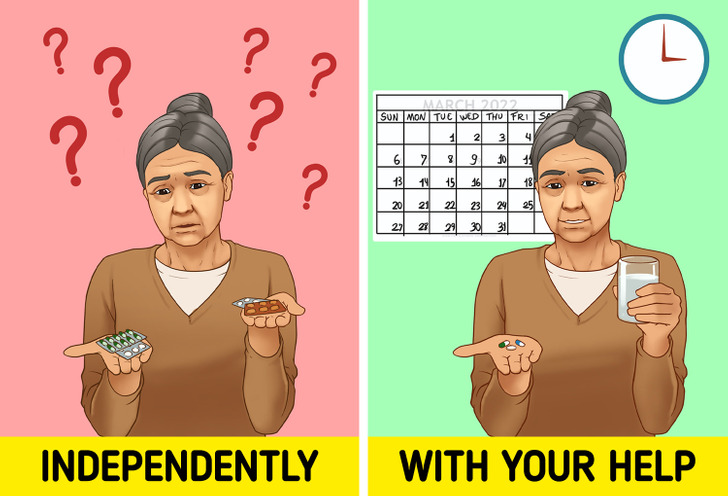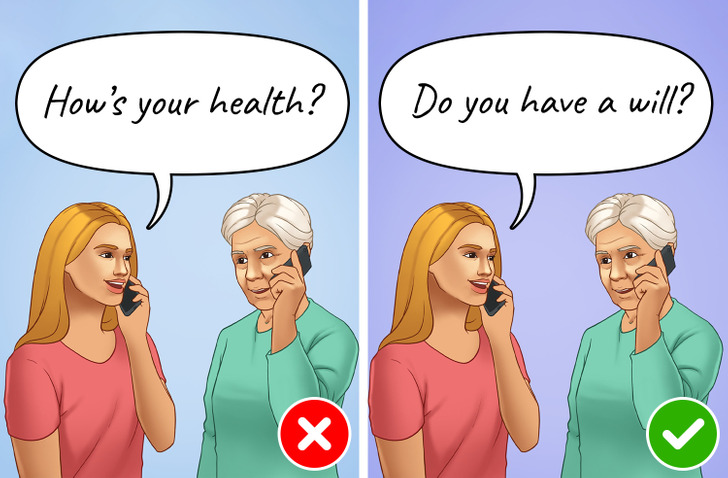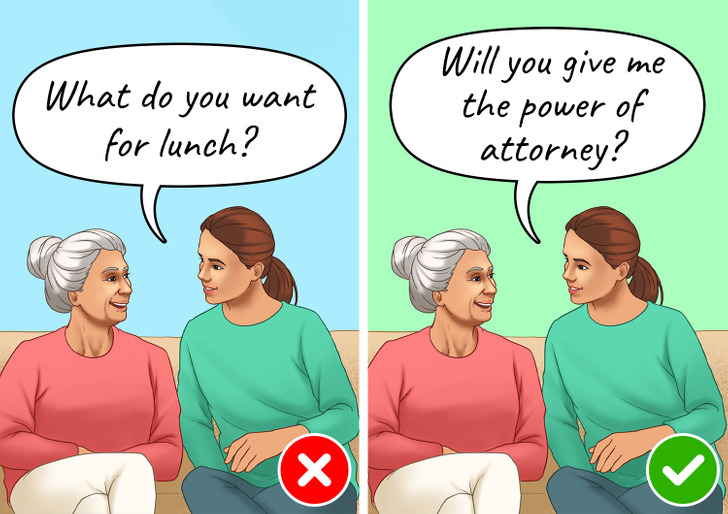12 Kids Whose Words Made Us Laugh Out Loud


Aging can be a sensitive topic that many people are reluctant to discuss, especially if it concerns our loved ones. But avoiding important topics can create problems that could have been easily avoided. Sometimes, even if we want to talk about the consequences of aging, we just don’t know where to start from. Everything can seem so intimidating and stressful, both for us and our senior loved ones.
We at Bright Side searched for the best expert advice and compiled a list of important questions to ask your aging family members. As a bonus, you’ll find out how to approach this emotional topic without upsetting those you love the most.
Asking your aging parent about their medical care can prove crucial, especially in case of emergency. Gently ask them to share with you a list of doctors they regularly go to, and how to contact them in case you have to. You can also try to find out if your elderly family member has one primary doctor who coordinates their medical care. It’s always helpful to know who is in charge.
Ask them if they are willing to give you permission to speak with their doctor in case you have any concerns about their medical treatment. It’s important to let them know that you will respect their privacy and would only contact their doctor in case of emergency or with their permission.
Start a conversation about their plan for long-term care so that you know how to approach caregiving if needed. Ask them if they have long-term care insurance and do they have enough money to cover possible medical treatments. Medical and long-term care prices can be quite high, depending on the state, so it’s crucial to make sure your aging parent has the means to cover the bills.

Many seniors often take a dozen medications and supplements, which increases the risk of medication interactions and possibly life-threatening mix-ups of medicines. Asking your aging loved one whether they are able to manage their medications on their own may help you gauge if they are capable of doing it independently and correctly. Ask them if they understand the purpose of each medicine they take.
Ask your parents if they keep a list of all medications and supplements they take and if they are willing to share it with you. In case of a medical emergency, you will be able to give this information to the hospital staff, which can be life-saving. What’s more, asking these kinds of questions can give you a clearer insight into their health condition.
To make your elderly parents safe and comfortable as they gradually lose their physical strength, make sure they live in a household where they will feel at ease. Ask them if they’d like to move into a smaller apartment that’s easier to maintain. It’s also important to check if there are some things you need to do to make their house safer as they age. Maybe some house improvements and changes will be necessary, so it’s best to start making them on time.

Asking your elderly parents if they have a will can seem awkward and even insensitive, but it’s very important. Having a will determines the future of not only their possessions, money, and property, but also memorabilia and pets. When someone dies without a will, it can take a lot of money and time to legally divide the assets. In many countries, a verbal statement won’t be sufficient in court.
There are some legal alternatives to a will, such as a living trust. This document allows a senior person to put their assets in the trust and designate a person who will be in charge of it in case of if they die or become incapacitated.
However, the most important thing you can do during the conversation is to be compassionate. This may be a sensitive topic for your parents, and it may be hard for them to talk about the fact that they are aging and getting closer to the end of life. Be attentive to your parents’ emotions during the conversation and know when to take a step back.
Knowing where your parents keep important documents can save you a lot of trouble in case the worst happens. Ask your elderly loved one to keep documents such as wills, birth and marriage certificates, social security cards, and financial papers in one folder so that you can have easy access in case you need them.
It’s also a good idea to have a list of all the documents and accounts, along with passwords and contact names for lawyers, accountants, and bankers. Also, make sure that these important documents are up-to-date and encourage your parent to check them each year.

It’s important to be familiar with your aging parent’s insurance and pension plans, retirement funds, and savings because income and assets can affect their health insurance coverage. Check if they have debt and if they need help managing some of their financial responsibilities.
You can ask them if they are willing to give you or another trusted person power of attorney over their financial affairs in case there’s a time they can’t manage them on their own. Another option is to have a joint checking account with your parent so that you can help them handle their finances and pay bills if necessary.
Knowing your aging loved one’s health issues and concerns can help you determine what kind of care they may require in the future. Get familiar with chronic health problems they are experiencing so that you can make joint decisions about their ongoing treatment.
Find out what type of long-term care your parent would want if needed. Would they require a live-in caregiver, or would they prefer to move to an assisted living facility or retirement center? You can ask them if they want to live in their own house for as long as possible, or perhaps move in with you or another relative.
It’s often hard for elderly people to accept the fact that they are losing their strength, and consequently, their independence. This can be a tricky topic to discuss, and most of them are reluctant to ask for help. That’s why it’s important to value their feelings and approach this discussion with gentleness and understanding. Some elderly parents refuse help even when they realize they are struggling with daily tasks.
In this kind of situation, it’s important to remember that your aging loved one is an adult, and their opinion should be respected. Try to stay away from arguing and, instead, keep offering a helping hand, love, and support for as long as you think they may need it. With time, they may realize that they indeed need help, and it would make their life much easier. When that happens, they’ll be able to count on you.
Numerous studies prove that staying active can increase life expectancy and contribute to healthy aging. In addition, meaningful social interaction also plays an important role in the overall well-being of people of any age, not just seniors.
According to researchers, aging people who socialize, not only with their family members but also with other people, are in better emotional and physical shape. So, talk to your elderly parents to find out what activities they may be passionate about and offer them to join. This can improve their quality of life and make aging a bit more joyful and easier for them and for you.
The most sensible approach to these kinds of touchy subjects is to carefully plan and think about such conversations in advance so that they are as positive and productive as possible. Write down the points you think should be addressed, so you don’t forget anything. To make things less stressful, address one issue at a time rather than trying to get answers to all questions at once. If you start with small steps, your parent will be more likely to respond positively and participate in the conversation.
If you still feel unsure and anxious about having this kind of discussion with your parents, you can consider sharing your ideas with other family members. You can even seek advice from a psychologist, social worker, or aging care professional. They can help you navigate the many issues related to aging.
Have you tried talking to your senior loved ones about any of these topics? How did they respond?











